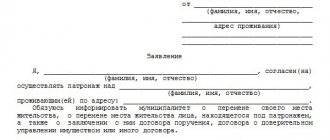10
Often in two-parent families, scandals break out between spouses, mother and father temporarily separate or simply do not contact each other. The result of this behavior is an infringement of the child’s rights, which manifests itself not only in lack of attention, but also in the lack of material support on the part of a negligent father or mother.
Is it possible to force an unscrupulous parent to make payments when living together and how to collect alimony for a minor while married?
Is it possible to apply for alimony without a divorce: features
No law states that in order to collect alimony it is necessary to get a divorce. As for payments for children, the main reason is indicated in Part 2 of Art. 80 of the RF IC: if one of the parents does not participate in the maintenance of a common child, the second has the right to recover funds through the court and enter into an alimony agreement.
Points to consider:
- It is not necessary to divorce and separate. Even if spouses live together, this does not mean that alimony cannot be demanded.
- Payments can be recovered for the maintenance of a spouse (Article 89 of the RF IC), a former spouse (Art. 90 of the RF IC), a minor child (Art. 80 of the RF IC), an adult disabled child (Art. 85 of the RF IC).
- For spouses and adult children, alimony is paid in a fixed amount (hereinafter referred to as TDS).
- For a child under 18 years of age, you can recover payments in TDS, shares of the payer’s earnings, or in a mixed form (TDS + shares).
The claimant can apply for a court order if alimony is needed as a share of the salary and the payer’s income is confirmed. The order will be issued in five days (Article 126 of the Code of Civil Procedure of the Russian Federation). In other cases, the case is considered as a claim proceeding.
Who has the right to claim alimony?
The parent who is dependent on the child has the right to file an application for the recovery of child support. Adult disabled children can act independently on their own behalf. If payments are needed to support a spouse, she goes to court.
Disability, pregnancy, being on maternity leave or caring for a common disabled child is the basis for the spouse to collect alimony for his own maintenance. Payments are assigned in a fixed amount, taking into account the financial situation of both parties and the cost of living.
Most often, the recipients are women, and the payers are men. The courts in most cases take the side of mothers when it comes to resolving disputes about children.
What documents are needed?
The documents required for the court can be divided into two categories:
- Confirming the legal grounds for receiving alimony:
- Birth certificates of children indicating the names of parents
- Marriage certificate
- A certificate from the housing office confirming that the applicant lives with the child (this is a necessary condition for receiving alimony)
- Demonstrating the income level of family members:
- Documents about the applicant's income: salary certificate from the place of work, sick leave for pregnancy, document confirming being on leave to care for a child up to 3 years old, document on pension or receipt of social disability benefits
- Documents on the defendant’s income: salary certificate from the place of work, documents on additional income (lease agreement for real estate owned by the defendant, deposit agreements, tax returns, etc.)
The applicant’s task is to document to the court that the second parent does not provide for the child’s needs, despite the fact that he has such an opportunity. And also your need for additional funds to provide for your children.
If we are talking about a fixed amount, it can be justified by attaching a set of receipts and checks confirming monthly expenses for the child: purchase of clothes, shoes, medicines, baby care products, food, payment for clubs, sections, additional education.
Professional lawyers recommend approaching the issue of preparing the second category of documents with particular seriousness. Each “piece of paper” works for you and can affect the final amount of alimony collected.
Methods for collecting alimony in marriage
In the Russian Federation, there are two ways to collect alimony for children and spouses:
- By agreement.
- Judicially.
Let's consider each of the options in detail.
Collection of alimony by agreement in marriage
An alimony agreement is drawn up between husband and wife if there are no disagreements. The document must be certified by a notary (Article 99 of the RF IC). Each person receives one copy after signing.
The main requirement for child support is that it should not be less than the amount that could be collected in court (Article 103 of the RF IC).
The specifics of the alimony agreement are regulated by several articles of the RF IC:
| Article | Explanation |
| Art. 99 | The contract on behalf of the alimony obligee in case of incapacity is concluded by the legal representative. In case of limited legal capacity, the transaction is made with the consent of the guardian |
| Art. 100 | In legal force, the agreement is equivalent to a writ of execution. The recipient has the right to present it, if necessary, to the FSSP or at the payer’s place of employment |
| Art. 101 | Change or termination of the agreement is made by mutual agreement, in the absence of such - in court |
| Art. 102 | An agreement where the amount of alimony is established is less than the amount that could be recovered through the court is declared invalid upon the application of the interested party |
| Art. 104 | By agreement, the parties determine the amount of alimony independently: in shares of the salary, in a fixed amount. It is allowed to provide property to provide financial support for the child |
| Art. 105 | Indexation is carried out according to the procedure established in the contract. If it is not specified, alimony is indexed in accordance with the cost of living |
Collection of alimony through court
Judicial procedure is relevant when the parties fail to reach an agreement. Also, going to court allows you to recover money for the past period.
What options are possible:
- Claim proceedings. The plaintiff is the recipient, the defendant is the payer. Consideration of the case takes up to 1 month (Article 154 of the Code of Civil Procedure of the Russian Federation). As a result, a decision is made and the plaintiff is issued a writ of execution. Next, the claimant can transfer it to the bailiffs or at the payer’s place of work for enforcement.
- Order production. The claimant submits an application to the court for an order to collect alimony. The document is prepared within 5 days, after which it is handed over to the applicant (Article 126 of the Code of Civil Procedure of the Russian Federation). The payer has the right to challenge it within 10 days, after which the order comes into force. If, after the payer has filed an objection, the judge cancels the order, alimony can only be recovered through a claim proceeding (Article 129 of the Code of Civil Procedure of the Russian Federation).
Important! The claimant independently determines how to demand alimony in court - by way of claim or writ proceedings. If the alimony obligee objects to the payments, it is recommended to file a claim immediately, since the court order will most likely be canceled after filing objections.
What documents are needed to apply for alimony? Full list
How to apply for child support for yourself?
Results
So, let’s highlight the main points of the topic presented in this article:
- To receive alimony from a parent who evades financial support for a child, it is not necessary to officially dissolve the marriage
- In addition to the child, a spouse who is disabled or in need of financial support has the right to alimony in marriage
- Alimony can be obtained either voluntarily (by agreement) or through the court (by receiving a court order or having achieved satisfaction of a claim)
- To obtain a court order, you need to submit a certain set of documents to the magistrate's court.
- The applicant does not pay the state fee
- Consideration of a case by order does not require the presence of the parties in court
- The case is considered within 5 days after filing the application
- The court order can be appealed within 10 days. If there is no appeal, after these 10 days the order comes into force.
- The start date of alimony payments is the date of filing the application with the court
- If the alimony payer refuses to voluntarily comply with the court decision, the order may be transferred to the FSSP
- For non-payment of alimony, a court decision provides for administrative or criminal liability.
If you have any questions or require clarification of this or that point in relation to a specific situation, please contact the lawyers of the Prav.io portal.
If the collection of alimony in marriage requires legal proceedings, you can find a family lawyer on the portal who will help you win the case in court.
Amounts of child and spousal support
According to Art. 81 of the RF IC, the amount of alimony payments depends on the number of children:
- For one child – 25% of earnings.
- For two children – 33%.
- For three children or more.
The size of the salary is also important - it is from it that deductions are made.
Example. Salary is 20,000 rubles, one child.
20,000 x 25% = 5,000 rub.
Under similar conditions and a salary of 100,000 rubles. different value:
100,000 x 25% = 25,000 rub.
When determining alimony as a share of salary, the financial situation of the parties is taken into account. It is possible to submit an application to reduce alimony payments if the payer has other alimony obligations or other valid reasons.
From what income is alimony withheld?
The list of income for deduction of alimony is determined by Decree of the Government of the Russian Federation of July 18, 1996 N 841 “On the list of types of wages...”.
It includes:
- Salary.
- Monetary allowance.
- Unemployment benefit.
- Fees.
- Rewards and bonuses.
- All types of pensions and benefits, with the exception of survivor benefits.
- Payments for sick leave.
- Severance pay upon dismissal due to reduction.
- Convict's earnings.
- Payments for periods of maintaining the average salary.
Recovery is also possible from amounts of financial assistance, with the exception of compensation for harm to life and health in connection with death, a major accident or catastrophe, or natural disaster.
Alimony in a fixed amount
If the amount of earnings cannot be determined or payments in shares do not allow the child to be supported normally, they are collected in a fixed amount (Article 83 of the RF IC). This includes cases of absence of work or receipt of wages by alimony-obliged persons in foreign currency.
What indicators are taken into account when assigning payments:
- living wage;
- financial position of the parties;
- minimum wage (relevant for collection for the past period).
The plaintiff independently determines the amount of alimony in the claims. It is recommended to focus on the cost of living per child in the region. Since May 2021, the minimum wage and monthly wage have been equalized, in 2021 they are equal to 12,130 rubles, but in some regions increased amounts are established.
Mixed alimony
Mixed alimony includes fixed amounts and shares of salary. Appointed when the payer has official income and additional earnings.
Interest is deducted from the established salary; alimony is collected from additional income in a fixed amount if its value cannot be determined.
Sample documents for filing alimony from R.TIGER
There is no unified template for drawing up a statement of claim, since the situations that encourage people to seek support are different. It is mandatory to include the following information: name of the court in which the claim was filed; details of the applicant and the alimony provider; information about the place of residence of the parties; application amount; circumstances justifying the applicant's claims; evidence confirming the plaintiff’s case.
The calculation as a share of income is as follows:
Let's assume that the payer receives a monthly salary of 25,000 Russian rubles and has no additional sources of income. So, he will be required to pay: 25% of the salary amount - if there is one child, this will amount to 6,250 Russian rubles; 33% of the salary amount - if there are two offspring and will amount to 8,250 Russian rubles; 50% of the salary amount - for three offspring this will be 12,500 Russian rubles.
The calculation in a fixed amount will be made as follows:
For example, child support was set at a substantial amount of 50% of the subsistence level. On average, we take an arbitrary value of 10,000 rubles (the actual amounts differ for each region of the country and change every quarter). Thus, the payer must pay 5,000 rubles for one offspring, 10,000 rubles for two, etc.
Lawyers and family law attorneys can help simplify the procedure for collecting alimony.
How to file alimony in marriage through the court: step-by-step instructions
If there is no agreement on the payment of alimony, collection is made through the court. The procedure is as follows:
- Collect evidence confirming that the husband does not support children. Checks and receipts for payment for purchases and sections for the child, paid for by the mother, are suitable.
- File a claim.
- Send one copy of the application to the defendant.
- File a claim with the remaining documents in court.
- Receive notice with the date of the first court hearing.
- Attend the hearing.
- Receive an extract from the court decision and IL.
Claims may be satisfied in whole or in part. The IL is subsequently transferred to the defendant’s place of employment or to bailiffs.
If you are not satisfied with the court decision, an appeal is made through the appellate procedure before it enters into force (within one month).
Contents and sample of the statement of claim
The application must comply with the requirements of Art. 131 Code of Civil Procedure of the Russian Federation on content. What it says:
- Name and address of the court.
- Full name, registration address, passport details, telephone number of the plaintiff.
- Full name, residence address of the defendant.
- Bank account details for transferring payments.
- Information about the marriage: date of conclusion, series and number of the certificate.
- Information about the child: full name, date of birth, data from the child’s certificate.
- Circumstances of the case: cohabitation, non-participation of the spouse in financial support of the child, expenses for his food and education.
- Claims: to collect alimony in a fixed or shared amount, in a mixed form.
At the end there is a signature and date of compilation.
Sample claimJurisdiction of cases of alimony collection
The statement of claim is filed with the city or district court at the place of residence of the plaintiff (Article 29 of the Code of Civil Procedure of the Russian Federation) or the address of the defendant. The plaintiff determines the territorial jurisdiction himself - where it is more convenient to apply.
Documentation
The list of documents depends on the specific situation. If child support is being sought for a minor child, you will need:
- Plaintiff's passport.
- Child's birth certificate;
- Statement of claim.
- Receipts confirming expenses for a minor (preferably).
- Certificate of family composition.
- Marriage certificate.
If payments are needed for an adult disabled child, additional disability certificates are provided. To collect alimony for a wife during pregnancy, you will need certificates from the antenatal clinic, and during maternity leave, documents confirming the maternity leave.
Amount and payment of state duty
According to Art. 333.19 of the Tax Code of the Russian Federation, the amount of the state duty when filing a claim for alimony is 150 rubles. If payments are collected from a child and a parent, the duty increases to 300 rubles.
Based on Art. 333.36 of the Tax Code of the Russian Federation, plaintiffs in cases of alimony collection are exempt from paying state fees, so there is no need to provide a receipt.
Grounds for refusal
In most cases, the courts take the side of the plaintiffs in cases of alimony, but there may be negative decisions if:
- The child has reached the age of majority and is not disabled.
- Payments are recovered from the disabled person, but the disability was removed at the time the claim was filed.
- Emancipation of a minor: employment, marriage, entrepreneurial activity.
- Adoption of a child by another man.
You may also encounter a refusal when accepting documents that do not comply with legal requirements in form or content.
Procedure and time frame for consideration of a claim
The judge is given no more than 5 days to accept the statement of claim for proceedings, after which the parties are notified of the appointed date of the first (preliminary) court hearing in writing - rulings are sent to them at their registration addresses.
The process takes 1 month, but a decision can be made in one hearing if there are no controversial issues. If the defendant does not come to the hearings without good reason, the judge may make a decision in absentia, without his participation (Article 233 of the Code of Civil Procedure of the Russian Federation).
What evidence must be presented to the court?
All facts stated in the appeal to the court require documentary evidence or eyewitness testimony.
As evidence when considering cases of awarding alimony in marriage, the judge may take into account the following documents:
- checks and sales receipts indicating the plaintiff’s purchase of clothing, shoes, school supplies, and other expenses necessary to meet the child’s needs;
- receipts for payment of housing and communal services;
- confirmation of payment of funds for kindergarten, school meals, clubs, sports sections.
- testimony indicating the plaintiff’s participation in raising the child, given by teachers, relatives, neighbors, and pediatricians. The child himself can answer the court’s questions if his age is more than 10 years;
- a certificate stating that the spouse is registered at a drug treatment clinic;
- a certificate issued by the employer containing information that the defendant often travels on business or works on a shift basis;
- certificate of salary.
pay attention! As stated in Art. 57 of the Code of Civil Procedure of the Russian Federation, when the plaintiff is unable to present documents concerning the defendant (certificates issued by the employer or medical institution), he can ask the court to do so. To do this, you need to submit a petition - oral or written.
How to apply for alimony in marriage through State Services
The portal does not provide the ability to file a claim for alimony, but you can use a confirmed account on the State Automated System “Justice” resource. What should be done:
- Log in using your State Services account.
- Select the “Civil Proceedings” section and click on “Submit an Application.”
- Click on “Claim Statement”.
- Choose a court.
- Attach a pre-drafted application and documents to it.
- Select “The applicant is exempt from paying the state duty...”.
- Click on “Generate an application”.
The documents will immediately be sent to the court electronically. They can also be submitted by a representative of the plaintiff, but he will have to indicate the information of all participants in the process.
Preparation for collection
Child support obligations are imposed on the child's biological parents. In the case of an official marriage between adults, the fact of relationship with the child is considered an axiom. If the parents only cohabited, a procedure for establishing the paternity of the child is mandatory. There are two ways to obtain proof of relationship with a child:
- In the Civil Registry Office, when issuing a birth certificate, parents are also offered a certificate of paternity. Even if the father is not biological, but agrees to be considered as such, he will be included in the documents for the baby. Subsequently, this event may be disputed.
- Judicially. In this case, the fact of relationship with the child is established by evidence through any materials that can confirm it. These are audio and video recordings of conversations, dialogues from the Internet, SMS, etc. If the court finds the proposed evidence insufficient, a DNA test is performed, which gives an irrefutable result. The initiators of such meetings are most often mothers planning to collect alimony.
Practical examples
To understand the specifics of collecting alimony, it is enough to familiarize yourself with practical examples.
In marriage, a mortgage has been issued or the person obligated to pay alimony pays loans
If the payer has credit obligations, this does not exempt him from paying alimony - the interests of the child are taken into account first. The amount of alimony is calculated from earnings or other income after withholding personal income tax and other government contributions, but excluding loan payments. A man earns 30,000 rubles, 15,000 rubles. transfers monthly to pay off the mortgage. There is one child. Alimony was collected in the amount of 25% of income, i.e. 7,500 rubles. After payments to the child and the creditor, 7,500 rubles remain in hand.
Wife on maternity leave
A man earns 50,000 rubles and has two children. The youngest is 2 months old, his wife on maternity leave filed for alimony. For children, payments are calculated as follows: 50,000 x 33% = 16,500 rubles. Alimony for a wife is established taking into account the subsistence level. The PM is 11,163 rubles, the claim indicates a demand for the recovery of half of the PM, i.e. 5,581.5 rubles. The plaintiff is supported financially by his parents, which the defendant was able to prove. The claim was partially satisfied, payments were assigned - 4,000 rubles. to the spouse.
Child support is already paid for the first child
The man has one son from his first marriage. In the second marriage a daughter is born. Earnings are 30,000 rubles. 30,000 x 25% = 7,500 rub. - child support for my son. The wife files a claim to recover payments to her daughter in the amount of 25% of her income. In total, the man has to pay 50% instead of the established 33%, which is the basis for reducing payments. The payer files a claim to reduce the amount of alimony. The court assigns the legal 33% or 16.5% of income for each child.
How to prove that the husband does not support the child
When applying for a court order, no evidence is required. It is the spouse who will have to prove that your demand is not justified, and he supports the child. If a claim is filed, everything becomes more complicated. The law places the burden of proof on the applicant. Therefore, in order to collect alimony from a spouse, the plaintiff must prove that he does not participate in the maintenance of the child. The following can be presented as evidence:
- an extract from the house register at the place of residence of the mother and child (if the spouse lives separately);
- testimony of witnesses (relatives, neighbors, friends);
- checks confirming expenses for the child.
What to do if the father does not recognize the child
On the other hand, establishing paternity is a necessary step in cases where the father does not recognize the child and, after his birth, refused to make an entry about himself in the baby’s birth documents.
In this case, the baby’s mother must collect the maximum set of evidence confirming the relationship between the father and the baby.
These include:
- photos and videos;
- witness's testimonies;
- utility bill receipts;
- references, characteristics.
During the court hearing of the dispute, the woman must file a claim to order a DNA examination.
Important! The study can only be carried out with the consent of the man; if the father refuses to undergo the study, the court makes a decision based on the evidence submitted by the woman and, as a rule, recognizes the man as the father of the child.
Example. Citizen A. and citizen B. lived together in the man’s apartment for three years, ran a joint household and spent the financial budget together. After a year and a half of civil marriage, a daughter was born. But in order to receive more benefits from the state, the woman, while registering her daughter’s birth certificate, said that she was raising the baby herself and refused to give the father’s details.
When the child was one and a half years old, the couple separated and the woman filed a lawsuit to recover alimony from her common-law spouse. At the court hearing, the defendant refused to undergo a DNA examination, but did not admit his paternity. The court analyzed the testimony of neighbors, extracts from medical records, receipts for utility bills and decided to confirm paternity solely on material evidence. By a court verdict, citizen B. was recognized as the father of the child and alimony was collected from him in favor of the baby.
Grounds for termination of payments
The grounds for termination of alimony obligations are specified in Art. 120 IC RF. This is possible in the following cases:
- Death of the recipient child or paying parent.
- Child's coming of age.
- Onset of legal capacity, removal of disability.
- Adoption.
- Emancipation of the child.
Alimony obligations are not inherited. But if the payer has accumulated a debt and he dies, the heirs will have to repay it within the limits of the value of the inherited property (Article 1175 of the Civil Code of the Russian Federation).
What are the differences between official marriage and cohabitation?
Before moving on to the issue of how child support is paid in a civil marriage, we consider it necessary to pay attention to the difference between a civil marriage and an official one. According to the current legislation, an official marriage is considered to be a relationship between a man and a woman, which is registered in the registry office. A new unit of society, the family, receives an official document - a marriage certificate. From this moment on, spouses are endowed with certain rights and responsibilities. Each spouse's passport is stamped. Cohabitation implies a relationship in which people do not have a marriage certificate or do not have a stamp in their passport.
Legally, rights and obligations are not established between such persons.
A certain category of citizens believes that civil marriage is cohabitation, but this opinion is wrong. A civil marriage is an officially registered relationship, while cohabitation is the same relationship, but not officially registered.
Establishing paternity
The father of a child in cohabitation does not always voluntarily recognize himself as the biological father. There are situations when paternity needs to be established, that is, proven. Some men initially recognize themselves as the father of a newborn child. To officially document this, it is necessary to submit an application in person at the registry office, or the father and mother submit an application separately from each other. In this case, the collection of alimony will be carried out according to the standard procedure. Some difficulty arises when a man refuses to recognize himself as the biological father. Here, in order to be able to receive alimony for a minor child, the mother must prove paternity.
There are several ways to establish paternity:
- Availability of a document confirming marriage between a man and a woman.
- An application to recognize a man as the father and record him as such on the child’s birth certificate.
- Through the court.
The last method is the most difficult.
It is used only when a man voluntarily refuses to recognize himself as the father of a child. When considering an application, the court carefully examines all evidence, all circumstances that are relevant to the case under consideration. Recently, DNA testing has become widespread. This procedure is paid. The plaintiff pays for it personally.
If a DNA examination proves that the defendant is the father of the child, then he will reimburse all expenses incurred by the plaintiff associated with the examination.
In practice, there are situations when the defendant refuses to provide biological material for examination. In such circumstances, the court, in most cases, takes the side of the plaintiff. Not all representatives of the fair sex know about this procedure. They mistakenly believe that it is impossible to collect child support during cohabitation, but filing a claim in court solves this problem.
Arbitrage practice
Cases regarding the collection of child support are considered by the courts, regardless of whether their parents are married or not. The same standards are used everywhere. Here are some examples:
- The woman decided to collect alimony from her husband for two children in the marriage, he agrees with the requirements. By decision No. 2-4148/2015 2-4148/2015~M-2132/2015 M-2132/2015 dated April 30, 2015 in case No. 2-4148/2015 the claim was satisfied.
- The wife recovered from her husband payments in the amount of 1/3 of her earnings for the children, as well as alimony for herself in the TDS (Decision No. 2-409/2020 2-409/2020~M-356/2020 M-356/2020 dated April 13, 2021 . in case No. 2-409/2020).
- From the man, the wife collected 0.5 PM for each of the four daughters (Decision No. 2-559/2020 2-559/2020~M-334/2020 M-334/2020 dated February 26, 2021 in case No. 2-559 /2020).
Is it possible to demand?
If, after official registration, a born baby automatically acquires a mother and father, and with them the opportunity to receive financial support in the event of a family breakdown, then in case of cohabitation the fact of birth has to be confirmed.
The basis for issuing child support in a civil marriage is:
- voluntary recognition of paternity: a man comes with the baby’s mother to the registry office and submits a joint application to register the newborn and enter a record of paternity in the civil register;
- judicial recognition of paternity if a man refuses to voluntarily register the child in his name.
Lawyer's answers to private questions
Where to apply for alimony without marriage to support a pregnant woman?
By law, payments are assigned only to the current or former spouse during pregnancy and for three years after childbirth. If the marriage has not been registered, alimony is not due. They can be claimed for a child if paternity is established voluntarily through a joint application. If not, the relationship can be established through the court and the money can be immediately recovered (Article 49 of the RF IC).
How to apply for spousal support for a disabled, needy wife?
In general, a woman can file a claim with the district court at her place of residence or the address of the defendant. To confirm incapacity for work, you must provide medical certificates and a rehabilitation program. Need is confirmed by a certificate of the amount of pension or salary, checks for the costs of treatment and food.
Is it possible to file for child support while married?
Child support can only be recovered from an adult able-bodied child (Article 87 of the RF IC). The court will take into account the plaintiff's need. For example, if the applicant is on disability but has a spouse with a good income, and the respondent earns little and supports other dependents, minimum payments may be imposed or denied.
What should you do if you apply for alimony while you are married and your husband does not pay?
Marital relations do not exempt the alimony obligee from paying the debt. In addition, the creditor may demand a penalty in the amount of 0.1% of the debt amount for each day of delay (Article 115 of the RF IC). The debt itself does not need to be collected separately; it will continue to accumulate until full repayment. If the delay is more than two months, you can submit an application to the bailiff to bring the debtor to administrative responsibility under Art. 5.35.1 Code of Administrative Offenses of the Russian Federation. Also, the bailiff is obliged to take measures provided for in Chapter. 7 Federal Law dated 02.10.2007 No. 229-FZ “On Enforcement Proceedings”, if there are grounds.
My wife filed for child support in the marriage, but I don’t work - I can’t find a decent job. Am I required to pay?
Yes. Lack of work does not relieve one from the obligation to support children. Even if you are not employed, you can still be charged a fixed amount. If you fail to pay, the debt will accumulate and you may be subject to administrative and then criminal liability.
Who can claim payments
The Family Code provides for certain financial responsibilities of one of the spouses to his child (his children) and his spouse. In accordance with Article 89 of the Family Code of the Russian Federation, the following have the right to receive alimony without dissolving the marriage:
- a wife who is pregnant or caring for a child (one or more) under 3 years of age or a disabled child;
- a non-working husband caring for a child (one or more) under 3 years of age or a disabled child;
- disabled spouse;
- a minor child (if he is a joint child of the spouses);
- a disabled child who has been assigned disability group I.
Regarding the last category of persons from the above list, the right to receive alimony without dissolving the marriage is not lost even when they reach the age of majority.
Filing a divorce to obtain alimony is not an absolutely mandatory procedure. The amount of alimony to be demanded from one of the spouses for the maintenance of a child (one or more) or the second spouse does not depend in any way on the presence or absence of a marital relationship.
Alimony agreement
Alimony in a civil marriage can be paid both forcibly and by mutual agreement of the parties. Mother and father have the right to establish the amount and procedure for payments on a voluntary basis. In this case, the parties enter into an agreement.
The document is drawn up in writing. A prerequisite is its certification by a notary. As a result, the agreement acquires the force of an executive document.
The agreement may provide for the payment of maintenance in the following forms:
- percentage of all types of income;
- fixed amount monthly;
- fixed amount once;
- transfer of large property into the ownership of a child;
- mixed form of payments.
A percentage of all types of income is an unpopular form of payment for the agreement. Calculation of the income level is the responsibility of the alimony payer. This option can give rise to abuse on the part of the father and violate the property interests of the minor.
Monthly payment of funds in the form of a fixed amount is the most common payment option. The amount is set at the discretion of the parties. The minimum amount is limited to ¼ share of all types of income.
If the payer does not have a permanent source of income, but is the owner of a large cash deposit, then it is possible to issue a one-time payment of financial security. The agreement will provide for the waiver of claims by the recipient. The document also provides for other conditions regarding funds. They can be transferred to the minor’s account or to the mother’s nominal account.
A citizen has the right to transfer property, for example, an apartment or a car, as alimony. To formalize the agreement, the consent of the other party is required. If the child to whom maintenance is intended has reached 14 years of age, then an agreement is drawn up with him. In this case, the mother agrees to the transaction.
The agreement may provide for various forms of alimony payments for the maintenance of the mother of a child in a civil marriage at the same time. To do this, it is necessary to reach a common opinion between the child’s parents.
Execution of a court decision
The decision to collect alimony is subject to immediate execution. After the verdict is announced, the writ of execution is issued to the plaintiff or immediately sent to the bailiffs (clause 1 of Article 428 of the Code of Civil Procedure of the Russian Federation).
The issued writ of execution can be presented during the period for which alimony was awarded.
Payment of alimony to the mother automatically stops after her death or at the end of the term under the agreement/writ of execution.
If life circumstances change, both parties can request a revision of the terms of the document at any time.
Reduce the amount of alimony
Each person paying child support has the right to file a lawsuit to reduce the amount of child support payments. However, the arguments must be irrefutable, since Russian legislation always protects the interests of the child.
Russian legislation considers the following to be valid reasons for reducing the amount of alimony:
- deterioration of the defendant’s health (discharge from hospital);
- care for elderly parents (certificates, extracts);
- dismissal from work;
- salary change:
- force majeure (loss of housing, fire, flood).
To get a positive result when filing a claim for alimony, the plaintiff needs to take the preparation of all necessary documents seriously. It’s better to do it one more time before taking documents to court.
Documents for an agreement on payment of alimony
The existence of agreements on financial support for a child can be expressed in the form of an agreement on the payment of alimony. In addition to the recipient and the payer, the presence of a notary is required at the time of concluding the agreement. An agreement certified by a notary acquires the force of an executive document.
In order to certify agreements, the notary must be provided with:
- passports of the parties containing registration (in the original);
- original birth certificate of each joint child;
- certificate confirming registration or divorce (in the original);
- a certificate received at the place of residence of the alimony recipient;
- certificates indicating the level of income of participants.
Additional justification for agreements concluded regarding incapacitated minors are expert opinions issued by medical and social experts.
A notarized agreement is subject to immediate execution. Failure to comply with its conditions allows the alimony claimant to apply for a notarial signature, for which the claimant must provide:
- own passport with registration;
- children's birth certificates;
- document on marriage or divorce;
- certificate from your place of residence.
Having a child support agreement allows you to receive child support on a voluntary basis. In fact, the document is a reflection of agreements on the amount, timing and procedure for making payments.
It must be remembered that agreements that infringe on the child’s rights to support are invalid. Infringement of rights must be understood as reaching agreements on payments in amounts that are lower than those defined by the legislator (1 child - a quarter of income, 2 - 33%, 3 or more - the second part).
In what cases is alimony collected from a son in favor of his parents?
The main conditions for collecting alimony from adult children in favor of their parents are:
- parent's disability;
- parent's need for help.
The first basis is used in cases where parents reach retirement age or become disabled. To confirm these circumstances, you will definitely need an ITU certificate or a pension certificate of the claimant.
In the case of applying the second basis, the fundamental evidence is the relevant certificate of the amount of the parent’s pension and documents on expenses. Typically, the starting point for determining need is the pensioner's living wage. If the pension and other income is less than this amount, the need is considered obvious.
For example, there are often situations when a parent, after the death of his spouse, is left to live alone in an apartment, which he simply cannot pay for, due to the small size of the pension, disproportionate to the established minimum subsistence level. At the same time, children often do not consider it necessary to help their parent. As proof of expenses, you can provide paid utility bills, as well as receipts for purchased expensive medicines.
When assessing the parents' need for help, only vital needs are taken into account: food, medicine. Communal payments. Mother and father will not be able to demand their son’s help to buy a new apartment, car or trip to a sanatorium, unless the latter is a medical indication.
Establishing paternity
The law provides for the recognition of a child without entering into a formal union with his mother. The process depends on the man's opinion. The following options are possible:
- voluntary;
- judicial.
The voluntary process of establishing paternity requires the consent of the child's mother. The parents must jointly apply to amend the minor's birth records.
Mother and father pay the state fee and submit a petition to the district registry office. The father has the right to change the child's surname and patronymic. The minor receives a new birth certificate.
Important! After reaching 10 years of age, parents should check with their child about the possibility of changing personal data.
If the cohabitant refuses to recognize the minor as an official child, then the only option is to establish paternity in court. To do this, the mother or father must file a claim in the district/city court at the place of residence of the defendant. The defendant is the parent who is against establishing paternity.
The law provides for the court to consider various types of evidence. In this case, the most accurate result is the result of genetic testing. A DNA test is ordered by the court. Payment for the research is assigned to the losing party.











